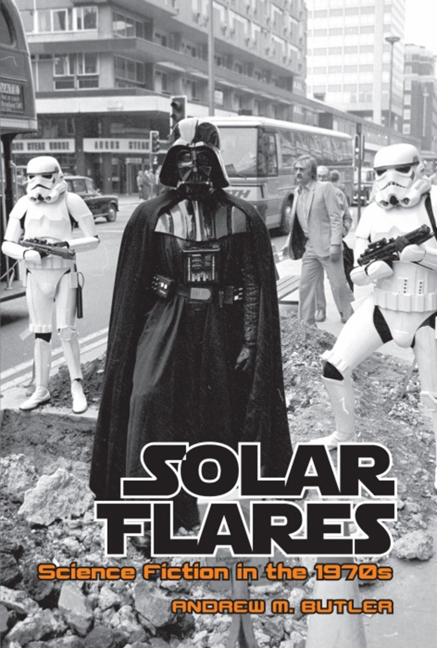Book contents
- Frontmatter
- Dedication
- Contents
- Acknowledgements
- Prologue
- 1 The Ends of First Sf: Pioneers as Veterans
- 2 After the New Wave: After Science Fiction?
- 3 Beyond Apollo: Space Fictions after the Moon Landing
- 4 Big Dumb Objects: Science Fiction as Self-Parody
- 5 The Rise of Fantasy: Swords and Planets
- 6 Home of the Extraterrestrial Brothers: Race and African American Science Fiction
- 7 Alien Invaders: Vietnam and the Counterculture
- 8 This Septic Isle: Post-Imperial Melancholy
- 9 Foul Contagion Spread: Ecology and Environmentalism
- 10 Female Counter-Literature: Feminism
- 11 Strange Bedfellows: Gay Liberation
- 12 Saving the Family? Children's Fiction
- 13 Eating the Audience: Blockbusters
- 14 Chariots of the Gods: Pseudoscience and Parental Fears
- 15 Towers of Babel: The Architecture of Sf
- 16 Ruptures: Metafiction and Postmodernism
- Epilogue
- Bibliography
- Index
16 - Ruptures: Metafiction and Postmodernism
- Frontmatter
- Dedication
- Contents
- Acknowledgements
- Prologue
- 1 The Ends of First Sf: Pioneers as Veterans
- 2 After the New Wave: After Science Fiction?
- 3 Beyond Apollo: Space Fictions after the Moon Landing
- 4 Big Dumb Objects: Science Fiction as Self-Parody
- 5 The Rise of Fantasy: Swords and Planets
- 6 Home of the Extraterrestrial Brothers: Race and African American Science Fiction
- 7 Alien Invaders: Vietnam and the Counterculture
- 8 This Septic Isle: Post-Imperial Melancholy
- 9 Foul Contagion Spread: Ecology and Environmentalism
- 10 Female Counter-Literature: Feminism
- 11 Strange Bedfellows: Gay Liberation
- 12 Saving the Family? Children's Fiction
- 13 Eating the Audience: Blockbusters
- 14 Chariots of the Gods: Pseudoscience and Parental Fears
- 15 Towers of Babel: The Architecture of Sf
- 16 Ruptures: Metafiction and Postmodernism
- Epilogue
- Bibliography
- Index
Summary
Some of the sf of the 1970s had turned in on itself, partly in an attempt to find a way past the internecine warfare of the successors to First sf and the New Wave and partly to find a renewed sense of purpose, post-Apollo 11. The ‘big dumb object’ trope pastiched hard sf and authors drew on the works of (Mary) Shelley, Verne, Wells and Burroughs, allowing a post-imperial commentary on colonial narratives. New readers were the third generation to have grown up reading sf. Sometimes science fiction was referenced in sf texts as part of the verisimilitude – the captain kirks watched by characters in Philip K. Dick's Flow My Tears, the Policeman Said (1974) – on the principle that people in the future will still consume sf, or as in-joke – the Master (Roger Delgado) watching The Clangers (16 November 1969–10 October 1974) in ‘The Sea Devils’ (26 February–1 April 1972) or reading War of the Worlds (1898) in ‘Frontier in Space’ (24 February–31 March 1973) – but this could equally draw attention to the artificiality of the text. This could be sf about sf – the more explicit acknowledgment of any genre's conversation with its own rules and methods. In 1970, the critic and novelist William Gass coined the term ‘metafiction’ to refer to fiction that demonstrated knowledge of its own fictionality. William Shakespeare's Henry V (1599) draws attention to the fact that it is being performed, and Laurence Sterne's Tristram Shandy (1759–67) played games with the novel; now metafictional awareness was central to works by writers such as John Barth, Donald Barthelme, Christine Brook-Rose, E.L. Doctorow, John Fowles, B.S. Johnson, Muriel Spark and D.M. Thomas. Some of these writers also wrote sf, or something that looked like it, and will be discussed in this chapter among other postmodern sf writers: Robert Sheckley, Barry N. Malzberg, Richard Cowper, Christopher Priest, Kurt Vonnegut (and the film of Slaughterhouse-5 (George Roy Hill, 1972)), Philip José Farmer, Richard Brautigan, Tom Robbins, Robert Shea and Robert Anton Wilson, William S. Burroughs, Thomas Pynchon, Doris Lessing, Kingsley Amis, Emma Tennant, Angela Carter, John Sladek, Frederik Pohl, the television programme Welt am Draht (World on a Wire/World on Wires, Rainer Werner Fassbinder, 1973) and the early work of the cyberpunks.
- Type
- Chapter
- Information
- Solar FlaresScience Fiction in the 1970s, pp. 221 - 234Publisher: Liverpool University PressPrint publication year: 2012



